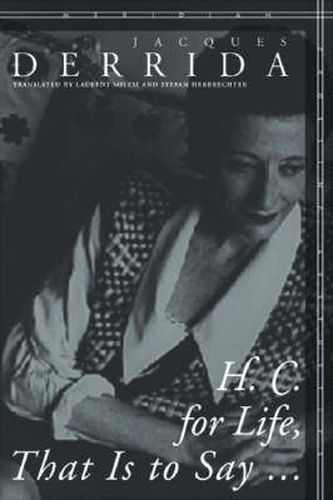Readings Newsletter
Become a Readings Member to make your shopping experience even easier.
Sign in or sign up for free!
You’re not far away from qualifying for FREE standard shipping within Australia
You’ve qualified for FREE standard shipping within Australia
The cart is loading…






H. C. for Life, That Is to Say … is Derrida’s literary critical recollection of his lifelong friendship with Helene Cixous. The main figure that informs Derrida’s reading here is that of taking sides. While Helene Cixous in her life and work takes the side of life, for life, Derrida admits always feeling drawn to the side of death. Rather than being an obvious choice, taking the side of life is an act of faith, by wagering one’s life on life.
H. C. for Life sets up and explores this interminable argument between Derrida and Cixous as to what death has in store deep within life itself, before the end. In addition to being a memoir, it is also a theoretical confrontation-for example about the meaning of might and omnipotence, and a philosophical and philological analysis of the crypts within the vast oeuvre of Helene Cixous. Finally, the book is Derrida’s tribute to the thought of the woman whom he regards as one of the great French poets, writers, and thinkers of our time.
$9.00 standard shipping within Australia
FREE standard shipping within Australia for orders over $100.00
Express & International shipping calculated at checkout
H. C. for Life, That Is to Say … is Derrida’s literary critical recollection of his lifelong friendship with Helene Cixous. The main figure that informs Derrida’s reading here is that of taking sides. While Helene Cixous in her life and work takes the side of life, for life, Derrida admits always feeling drawn to the side of death. Rather than being an obvious choice, taking the side of life is an act of faith, by wagering one’s life on life.
H. C. for Life sets up and explores this interminable argument between Derrida and Cixous as to what death has in store deep within life itself, before the end. In addition to being a memoir, it is also a theoretical confrontation-for example about the meaning of might and omnipotence, and a philosophical and philological analysis of the crypts within the vast oeuvre of Helene Cixous. Finally, the book is Derrida’s tribute to the thought of the woman whom he regards as one of the great French poets, writers, and thinkers of our time.